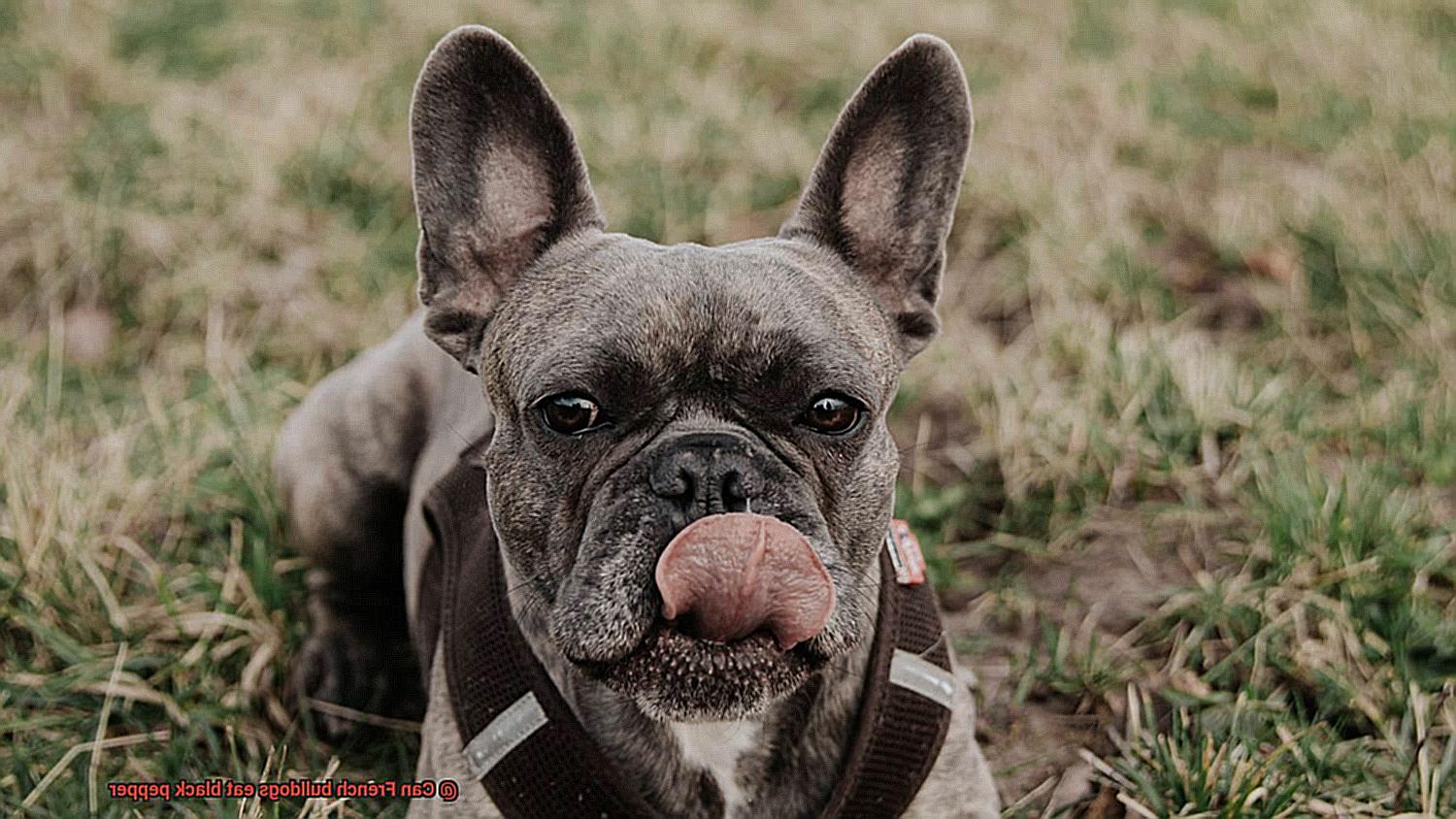Can French bulldogs eat black pepper?
As a devoted French bulldog owner, I’m always on the lookout for ways to keep my furry companion healthy and content. And when it comes to spicing up their meals, I can’t help but wonder if certain ingredients are safe for them. One such curiosity that often arises is whether French bulldogs can indulge in the fiery goodness of black pepper.
Black pepper, that ubiquitous spice we humans love, has numerous health benefits. But can our Frenchies reap the same rewards? While it may be tempting to share our favorite condiments with them, it’s crucial to consider the potential risks and benefits before introducing anything new into their diet.
Can French bulldogs eat black pepper?
Contents
- 1 Can French bulldogs eat black pepper?
- 2 What is Black Pepper?
- 3 Health Benefits of Black Pepper for Dogs
- 4 Potential Risks of Feeding French Bulldogs Black Pepper
- 5 The Digestive System of French Bulldogs
- 6 Respiratory Issues in French Bulldogs and Spicy Foods
- 7 Dog-Friendly Alternatives to Black Pepper
- 8 Consulting a Veterinarian Before Making Diet Changes
- 9 Conclusion
Risks:
Feeding French bulldogs excessive amounts of black pepper can upset their delicate tummies. This potent spice might irritate their sensitive digestive system, leading to stomach discomfort, vomiting, or diarrhea. Additionally, some dogs may even experience allergic reactions to black pepper, exhibiting symptoms like itchiness, redness, or difficulty breathing.
Benefits:
However, black pepper does offer potential health advantages for our four-legged pals. It contains a compound called piperine known for its anti-inflammatory properties that could help ease pain and swelling. Moreover, this flavorful spice boasts antioxidants and antimicrobial properties that can contribute to their overall well-being.
Expert Advice and Opinions:
While sprinkling a pinch of black pepper on your Frenchie’s food in moderation may not cause any significant harm, it’s crucial to proceed with caution. Each dog is unique and may react differently to various substances.
Consulting your veterinarian before introducing black pepper or any new ingredient into their diet is strongly recommended. They’ll assess your bulldog’s specific needs and health conditions while ensuring that any chosen spices align with their individual dietary requirements.
In conclusion, while black pepper may have its merits, we must remember that our French bulldogs have delicate digestive systems. Their safety and well-being should always be our top priority. When in doubt, seek the guidance of a veterinary professional. By doing so, we can savor the delights of mealtime while keeping our beloved Frenchies happy and healthy.
What is Black Pepper?
You may have wondered if black pepper is safe for your French bulldog’s consumption. In this article, we’ll dive into the world of black pepper, its origins, uses, potential health benefits, and whether it is suitable for our beloved Frenchies.
The Origins and Characteristics of Black Pepper:
- Black pepper, scientifically known as Piper nigrum, is a spice derived from the berries of a flowering vine.
- This versatile spice is native to India but is now grown in various countries around the world.
- The peppercorns are harvested when they are green and unripe, then dried to achieve their black appearance and enhance their distinctive spicy flavor.
Culinary Uses and Flavor Profile:
- Black pepper adds depth and heat to both savory and sweet dishes.
- It is commonly used in marinades, sauces, soups, stews, and seasoning blends.
- The pungent aroma and spicy taste of black pepper make it a staple condiment found on dining tables worldwide.
Potential Health Benefits:
- Black pepper contains a compound called piperine, which provides potential therapeutic effects.
- Piperine has been studied for its anti-inflammatory, antioxidant, antimicrobial, and digestive properties.
- However, these potential benefits are mainly observed in human studies, and more research is needed to understand its effects on our furry friends.

Is Black Pepper Safe for French Bulldogs?
- French bulldogs have sensitive digestive systems and may experience gastrointestinal discomfort if they consume large amounts of black pepper.
- Their brachycephalic anatomy makes them prone to respiratory problems, and spicy foods like black pepper can irritate their airways.
- It is advisable to consult with your veterinarian before introducing any new ingredients or spices into your French bulldog’s diet.

Dog-friendly Alternatives:
- If you’re looking to add flavor to your Frenchie’s meals, consider using alternatives like turmeric, parsley, or cinnamon.
- These herbs and spices not only provide taste but also offer potential health benefits for dogs.
Health Benefits of Black Pepper for Dogs
French bulldogs are beloved companions known for their unique personalities and adorable looks. As responsible pet owners, we are always on the lookout for ways to enhance their well-being.
While black pepper is a common spice in our kitchens, can it also benefit our furry friends? Let’s explore the potential health benefits of black pepper for French bulldogs and the precautions to take when incorporating it into their diet.
Anti-inflammatory properties:
Black pepper contains piperine, which has been found to possess anti-inflammatory properties. This can be especially beneficial for French bulldogs suffering from arthritis or joint pain, as it may help alleviate discomfort and reduce inflammation.
Antioxidant effects:

The presence of antioxidants in black pepper, including piperine, can protect your French bulldog’s cells from harmful free radicals. This supports overall health and may slow down the aging process, keeping your furry friend vibrant and healthy for longer.
Digestive support:
Piperine in black pepper has been shown to stimulate the production of digestive enzymes, aiding in efficient nutrient absorption and digestion. This can be particularly useful for French bulldogs with sensitive stomachs or digestive issues, promoting better digestion and reducing discomfort.
Precautions:
Moderation is key:
While black pepper can offer health benefits, it should be used in moderation. Too much black pepper can upset your French bulldog’s gastrointestinal system, leading to vomiting or diarrhea. Start with small amounts and gradually increase if tolerated well.
Individual variation:
Each dog is unique, and what works for one may not work for another. If your French bulldog has any underlying health conditions or is on medication, consult your veterinarian before adding black pepper to their diet.
Monitor their reaction:
Always observe your French bulldog’s response when introducing new foods. Look out for any signs of discomfort, allergic reactions, or digestive upset. If any adverse effects occur, discontinue the use of black pepper immediately and consult your vet.
Potential Risks of Feeding French Bulldogs Black Pepper
And while it may be tempting to share our meals with them, it’s essential to be aware of potential risks. In this article, we’ll dive into the potential dangers of feeding French Bulldogs black pepper. So grab a cup of tea, sit back, and let’s explore this spicy topic together.
Gastrointestinal Upset: Handle with Care
French Bulldogs have sensitive tummies, and black pepper’s spiciness can wreak havoc on their digestive system. Symptoms like diarrhea, vomiting, and abdominal pain may arise if they consume black pepper. Remember, their brachycephalic (flat-faced) anatomy already puts them at a higher risk for gastrointestinal issues.
Allergic Reactions: Look Out for Red Flags
Just like humans, our Frenchie pals can have allergies or sensitivities to certain foods or spices. Black pepper could trigger allergic reactions in some French Bulldogs, leading to skin problems, respiratory issues, or gastrointestinal symptoms. If you suspect an allergic reaction, consult your vet for a proper evaluation.
Harmful Essential Oils: Proceed with Caution
Black pepper contains essential oils that can irritate or damage your Frenchie’s mouth, throat, or gastrointestinal tract if consumed excessively. Long-term excessive consumption may harm their liver and kidneys as well. Remember, moderation is key when it comes to introducing spices into their diet.
Medication Interactions: Better Safe than Sorry
Spices like black pepper can potentially interact with medications your French Bulldog might be taking. Before adding new foods or spices to their diet, consult your vet to ensure there are no adverse interactions that could compromise their health.
Finding Safe Alternatives: Spice It Up Smartly
Although black pepper poses risks, not all spices are off-limits for French Bulldogs. Mild herbs like parsley or turmeric can provide health benefits when introduced in moderation. Remember, always consult your vet before making any changes to your Frenchie’s diet.
The Digestive System of French Bulldogs
When it comes to their sensitive digestive systems, caution is key. In this blog post, we’ll take a closer look at the digestive system of French Bulldogs and explore the potential risks associated with feeding them black pepper.
Understanding the Digestive System
Just like other dog breeds, French Bulldogs have a complex digestive system that consists of several organs and processes working together. It all starts in the mouth, where food is ingested and begins its journey through the digestive tract. French Bulldogs have sharp teeth that allow them to chew their food, but their shortened muzzle can sometimes lead to dental issues, making proper chewing a challenge.
From the mouth, food travels down the esophagus and into the stomach. The stomach plays a crucial role in breaking down food through the secretion of gastric juices. However, it’s important to note that French Bulldogs have relatively small stomachs compared to larger breeds. This means they may need smaller, more frequent meals to prevent overloading their digestive system.

After leaving the stomach, food enters the small intestine, where most of the digestion and nutrient absorption occur. Enzymes from the pancreas and bile from the liver help break down food particles into smaller molecules for absorption. It’s in this delicate balance that we must consider whether black pepper has a place in a French Bulldog’s diet.
The Black Pepper Predicament
Black pepper contains piperine, a compound responsible for its spiciness. While piperine may offer health benefits for humans, such as improving digestion and nutrient absorption, dogs have different digestive systems and metabolisms.
While small amounts of black pepper are generally safe for dogs, feeding them large quantities or highly spiced foods can potentially irritate their digestive system. This can lead to stomach upset, diarrhea, or other gastrointestinal issues. It’s crucial to consult with a veterinarian before introducing any new food or seasoning into your French Bulldog’s diet.
Safe Alternatives
If you’re looking to add flavor to your furry friend’s meals without risking their digestive health, there are safe alternatives to black pepper. Consider using herbs such as parsley, basil, or oregano to add a touch of flavor. These herbs are generally well-tolerated by dogs and can provide a pleasant aroma and taste to their meals.
Remember, the key is moderation and observation. Take note of how your French Bulldog reacts to different foods and seasonings. If you notice any signs of discomfort or digestive distress, it’s best to remove the ingredient from their diet and consult with your veterinarian.
Respiratory Issues in French Bulldogs and Spicy Foods
French Bulldogs are adorable and lovable companions, but their unique anatomy makes them prone to respiratory issues. As responsible pet owners, it’s crucial to understand how certain factors, like consuming spicy foods, can worsen these problems. Here, we’ll dive into the potential respiratory issues that French Bulldogs may face when consuming spicy foods like black pepper.
Let’s explore this topic together and ensure the well-being of our furry friends.
Respiratory Issues in French Bulldogs:
French Bulldogs have a higher risk of respiratory problems due to their brachycephalic anatomy. This means they have a short and flat skull shape, narrowed nasal passages, and an elongated soft palate. These structural features make it harder for them to breathe compared to breeds with longer snouts. Common respiratory issues in French Bulldogs include snoring, wheezing, difficulty breathing, and even collapsing episodes.
The Impact of Spicy Foods:
Spicy foods contain compounds like capsaicin that can irritate the airways and lead to inflammation. For French Bulldogs with pre-existing respiratory conditions such as brachycephalic airway syndrome (BAS), consuming spicy foods can further compromise their breathing. The irritation caused by spices like black pepper can exacerbate existing respiratory problems and make it more challenging for French Bulldogs to breathe comfortably.
Signs of Discomfort:
When French Bulldogs consume spicy foods, they may exhibit signs of discomfort such as coughing, sneezing, increased mucus production, or a runny nose. These reactions indicate that their sensitive respiratory systems are being irritated by the spices. It’s important to monitor your dog’s reaction to different foods and seek veterinary advice if you suspect any respiratory issues.
Preventing Respiratory Problems:
To minimize the risk of respiratory problems associated with spicy foods, it’s best to avoid feeding French Bulldogs any heavily seasoned or spicy dishes. This includes refraining from adding black pepper or other spices directly to their meals. Instead, opt for a balanced and appropriate diet that meets their nutritional needs without straining their respiratory system. Consider using safe alternatives like herbs to add flavor to their meals.
Dog-Friendly Alternatives to Black Pepper
As a responsible pet owner, it’s important to be mindful of what we feed our furry friends. While black pepper may add a tasty kick to our meals, it can potentially cause stomach upset, irritation, and digestive issues in dogs, including our beloved French Bulldogs. But fear not. There are dog-friendly alternatives that can still add flavor and taste to your pup’s meals without any harm.
One popular alternative to black pepper is turmeric. Not only does it provide a mild peppery taste, but it also offers various health benefits for dogs. Turmeric has anti-inflammatory properties that can help alleviate joint pain and stiffness, which is beneficial for French Bulldogs who may be prone to such issues.
In addition to turmeric, there are other herbs and spices that can be used as alternatives to black pepper. Cinnamon, for example, adds a warm and slightly sweet flavor to your dog’s meals. It also has antifungal and antibacterial properties that promote good oral health. Ginger is another great option, adding a zesty and slightly spicy taste while aiding in digestion and reducing nausea.
Fresh herbs like parsley can also be used as a flavorful substitute for black pepper. Not only does parsley add a refreshing twist to your dog’s meals, but it also helps freshen their breath naturally.
If you’re looking for an easy way to enhance the taste of your dog’s meals without relying on black pepper or spices, consider using natural flavor boosters like bone broth or low-sodium chicken or beef broth. These liquids add a savory element that will have your pup licking their bowl clean.
Incorporating fresh fruits and vegetables into your dog’s diet is another excellent way to add flavor naturally. Blueberries, sweet potatoes, and carrots are all tasty options that provide natural sweetness and an extra nutritional punch.
Remember, when introducing any new ingredients into your dog’s diet, it’s essential to do so gradually and in moderation. This allows you to monitor for any adverse reactions or allergies.
If you’re unsure about which alternatives to black pepper are best suited for your French Bulldog’s specific dietary needs and preferences, don’t hesitate to consult with a veterinarian or professional dog nutritionist. They can help guide you in making the right choices for your furry friend.

Consulting a Veterinarian Before Making Diet Changes
Making changes to your French Bulldog’s diet can be tempting, especially when you want to spice up their meals and give them a little treat. However, before you reach for that black pepper shaker, it is crucial to consult a veterinarian. Here’s why.
Unique Dietary Needs:
French Bulldogs, like any other breed, have specific dietary needs and restrictions. Just like humans, they can have allergies or health conditions that require special attention. Consulting a vet ensures that any changes you make to their diet are safe and appropriate for their individual needs.
Different Metabolism:
While black pepper may be safe for humans in moderation, dogs have a different metabolism and digestive system. What may seem harmless to us can cause digestive issues or even toxicity in our furry friends. Black pepper contains a compound called piperine, which can irritate a dog’s digestive system and lead to upset stomach, diarrhea, or vomiting.
Potential Allergic Reactions:
Some dogs may be allergic to black pepper or have adverse reactions to it. French Bulldogs are known to be prone to allergies, skin problems, and digestive disorders. By consulting a veterinarian, you can determine if black pepper is safe for your Frenchie or if there are better alternatives available.
Individual Health Conditions:
If your French Bulldog has any pre-existing health conditions or is on medication, certain foods may interact negatively with their treatment. A veterinarian will take these factors into account and provide personalized advice based on your dog’s specific needs.
Suitable Alternatives:
A vet can recommend suitable alternatives or supplements to incorporate into your Frenchie’s diet if needed. There are plenty of dog-friendly spices and ingredients that can add flavor and nutrition without the risk of gastrointestinal issues. Turmeric, cinnamon, ginger, parsley, bone broth, and fresh fruits and vegetables are great options that your pup will love.
1M5gz-V4Swk” >
Conclusion
In conclusion, it is not recommended to feed French bulldogs black pepper.
This spicy seasoning can cause digestive issues and discomfort for these adorable pooches. While a small amount of black pepper may not be harmful, it’s best to err on the side of caution and avoid giving it to your furry friend altogether.
Instead, opt for dog-friendly treats and spices that are specifically designed for their delicate systems.




